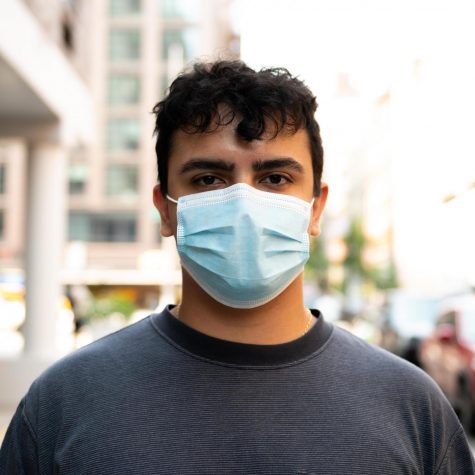The Soapbox: Poland, Ethiopia, COP26 climate summit
The Soapbox is a weekly column by WSN’s news desk examining the major developments in world news and rounding up the stories we think are worth the read this week. Global consciousness for a global university.
The Soapbox is a weekly news column rounding up stories worth reading for a global university. (Staff Illustration by Susan Behrends Valenzuela)
November 12, 2021
In Poland, nationalist Independence Day marchers salute the border
Right-wing nationalists took to the streets of cities across Poland on Thursday, celebrating the country’s Independence Day amid a tense border conflict with neighboring Belarus.
A court in Warsaw, Poland’s capital, had previously banned far-right groups from marching on Independence Day in response to a lawsuit from the city’s mayor. The suit cited violence in previous years and marchers’ use of slogans and flags with “all the hallmarks of fascist symbols.”
But the country’s Office of War Veterans intervened on Nov. 9, saying it had given the Warsaw march formal approval, allowing it to go ahead in spite of the court challenge. Across Poland, Independence Day rallies are being backed by officials from the right-wing ruling party of president Andrzej Duda.
This year’s Independence Day took place amid a serious dispute between Poland and Belarus over the status of thousands of migrants trapped at the border between the two countries.
Poland, the European Union and the United States are accusing Belarus’ authoritarian president, Alexander Lukashenko, of orchestrating the migrant crisis as a form of hybrid warfare — encouraging migrants to travel to the Polish border in retaliation for sanctions imposed on his regime. Polish authorities say they have deployed more than 15,000 soldiers, riot police and border guards to the area to repel the migrants, CNN reported.
In Ethiopia, Tigrayans and aid workers detained en masse as a civil war enters its second year
Ethiopian prime minister Abiy Ahmed declared a state of emergency last week as forces loyal to the Tigray People’s Liberation Front — a powerful ethnic nationalist group with a military wing that is fighting Ethiopian federal forces — continued to advance toward the capital, Addis Ababa, putting the Ethiopian federal government on the brink of collapse.
“We will bury this enemy with our blood and bones,” Ahmed, who received the Nobel Peace Prize in 2019, said at a recent rally in Addis Ababa that marked one year of the country’s brutal civil war.
Reuters reported on Nov. 10 that Ahmed’s government has rounded up and jailed a slew of high-profile Tigrayans across the country, accusing them of collaborating with the rebel forces, which the federal government designated as a terrorist group. Human rights groups say that ethnic Tigrayans have been subject to arbitrary detention and enforced disappearance since June, when the TPLF gained an upper hand by recapturing the Tigrayan capital of Mekelle from federal forces.
International humanitarian workers are not exempt from the crackdown. The United Nations says that the federal government has arrested and jailed 22 UN staff members, only six of whom had been released as of Tuesday. And in northern Ethiopia, on the only functioning road into the besieged Tigray region, 72 drivers working for the U.N. World Food Programme were jailed on Nov. 10. The government has not provided any explanation or evidence to support the mass detentions.
In Glasgow, “lip service to climate action” at the COP26 climate conference
The COP26 climate summit in Glasgow, Scotland, is scheduled to end Friday, Nov. 12. But talks at the summit have stalled, as diplomats from nearly 200 countries try to reach a consensus about what will be included in the conference’s final agreement document.
Experts say that dramatic action is needed to limit global warming to 1.5 degrees Celsius above pre-industrial levels. But U.N. secretary general António Guterres told the Associated Press Thursday that this goal is “on life support.”
Climate scientists from dozens of countries around the world penned an open letter on Nov. 11, urging leaders to acknowledge and act on the most recent findings of the Intergovernmental Panel on Climate Change, which Guterres called a “code red for humanity.”
The latest draft of the agreement says countries must “revisit and strengthen” their emissions targets by the end of 2022 — three years sooner than required by the Paris Climate Accords in 2015. Some experts welcomed the increased urgency, but many climate justice advocates are demanding more immediate action.
“This draft deal is not a plan to solve the climate crisis, it’s an agreement that we’ll all cross our fingers and hope for the best,” Jennifer Morgan, the executive director of Greenpeace International, said in a statement. “It’s a polite request that countries maybe, possibly, do more next year.”
Environmental watchdog Climate Action Tracker published a highly-anticipated report on Nov. 9, which warned that world leaders at COP26 are paying “lip service to climate action,” with weak commitments and little proof of execution since signing the Paris Climate Accords in 2015. The report concluded that humanity remains on track to go far past 1.5 degrees Celsius of warming by the end of the century.
“Policy implementation on the ground is advancing at a snail’s pace,” the group wrote. “Under current policies, we estimate end-of-century warming to be 2.7°C.”
Contact Suhail Gharaibeh at [email protected]
















































































































































